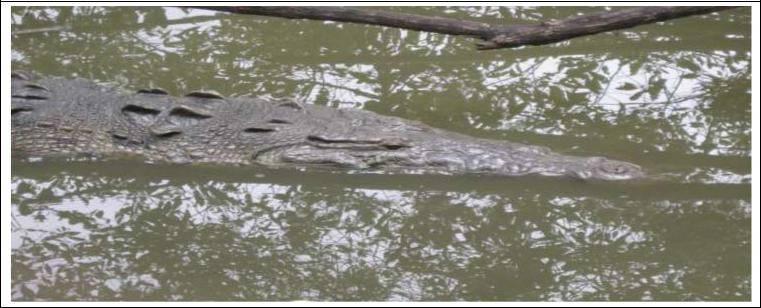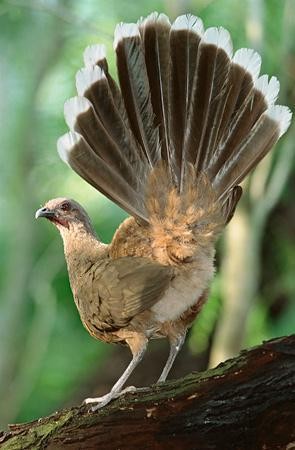By Tommy Clarkson from the December 2010 Edition

Still struggling with “retirement inactivity”, the other day I decided to enjoy another of my exploratory walks around our nearby mangrove. So casting keen and open eyes up in the trees and out in the water for tropical birds, not ten minutes into the overgrowth I was startled to hear a low, rumbling, croak nearby but a bit below me, “So, what are you doing down here in the Grove”?
Turning and as they say nearly jumping out of my skin as I realized that I was a scant twelve feet or so from a pointy snouted, thick and rugged skinned throwback to the dinosaurs . . . or what some folks around here call a Salt Water Crocodile.
Mid my reflex driven leap up from the brackish water edge a jump that may have well exceeded most collegiate track and field records it hit me, “I speak crocodile . . . or at least understand it! (Some may recall that I also recently learned that I speak fairly passable Hummingbirdese,)
Then, more or less ensconced on the proverbial “high ground”, some thirty feet away with several mangrove branches and small buses between us, I endeavored to recover from my somewhat bad form and strove to articulate a response.
“Well, sir . . . you are a sir, correct,” I politely ask. “Of course,” he impatiently snort-retorted – in a voice that sounded surprisingly like a lion’s roar, “do I look like a broad?” Taken aback by the growlish ferocity of his voice and recognizing political correctness was, obviously, not a crocodile priority, I hurriedly strove to cover my apparent gaffe, “No sir, you are most obviously all male!”
Apparently somewhat placated, he splashed his long and bulky long tail in a guttural manner, sounding as if he had a dry or sore throat, he harrumphed, “Well, that’s more like it.”
Seeking to further mollify him I respectfully inquired,
“Forgive my lack of awareness but inasmuch as I grew up in the land locked Midwest of the United States, I’m a bit unsure. What sort of somehow I remembering the Latin name from, high school biology, a crossword puzzle or some not-so-wasted time watching Jeopardy crocodīlus are you?”
He seemed pleased to have been asked and began to explain “Actually, there seems to be some confusion around here on that point very point. Basically, there are three varieties of us crocs here in Mexico. There’s the Crocodylus moreletii that’s a more modest sized fellow perhaps up to three meters in length that live in the fresh waters along the Gulf of Mexico. Because of similarities to them, they were long confused with the Cuban and American Crocodile.
For all intents and purposes, they’re found only in the southernmost parts of eastern Mexico. ”
Intrigued, I leaned against the tree I’d earlier nearly climbed as he continued, “Then ya’ got the Caiman crocodilus. ‘Caiman’, yo’ know, is a Spanish term for alligator or any Crocodilia. And these guys inhabit freshwater streams, marshes and swamps from southern Mexico, through Central America into northern Argentina.
They’re somewhat unique,” he said begrudgingly, “as they have a limited ability to change their color. Generally speaking, they are found only in the southernmost parts of Mexico.”
And then there’s the largest and handsomest,” and with that last word he slyly winked, “the Crocodylus acutus – the American Saltwater (or South American) Crocodile. Our snouts are relatively narrower and more elongated than that of the moreletii. The largest and most widespread of the crocodiles of the Americas is the ‘acutus’ calling their home along the Atlantic coast, from Guatemala north to the southern tip of Florida. On the Pacific coast we’ve got family ranging from central Mexico down as far as Venezuela, Equador and Peru.
With a bit of a braggadocios tone he went on, “Being salt water tolerant, we’re a flexible lot and reside in an array of watery locations including freshwater lakes, rivers and reservoirs and then in brackish coastal habitats – such as this mangrove – in tidal estuaries, coastal lagoons and every once in a while one of us will be found out at sea . . that’s how we came to inhabit a number of Caribbean and Pacific islands!”
While our average length is around 3 ½ meters, I had a cousin who was over seven meters in horizontal height! (That’s apparently crocodile) He was larger than those slimey kin of ours over in the Nile that
Hollywood’s made everyone so afraid of,” he finished, somewhat defensively.
Drawn into the conversation with this rather worldly wise fellow I inquired, “Is it true that crocodiles are more closely related to birds and dinosaurs than to most other animals that are classified as reptiles?”
“Yes indeed,” he croakily boasted, “and let me tell you some other crocodilius factoids you might not know.”
One, Crocodilus is derived from the Greek krokodeilos and means literally ‘pebble worm’, which I gotta’ say,” he mumbled with a bit of a huff, “doesn’t seem altogether all that complimentary.”
Two, the land speed record – set by a pal of mine from Down Under, an Australian Freshwater Crocodile – is 17 km/hor around 11 mph).” With a sly grin he asked, “how fast did you say you could run?” (I remembered somewhere reading that a normal, fit human could run right at 12 mph. H’mmm, 65 years old, overweight, and but questionably normal . . .
better just keep my distance!)
Three, our average age is around 70 years, but there’s some of us who hang in there until around the century mark and my great, great uncle, who lived in a zoo in Russia was around 130 years old when he croaked,”
Whereupon he broke into what I could only surmise was crocodile guffaws as he appreciated his own joke.
Four, our embryos do not have sex chromosomes and, as a result, unlike humans, our sex is not determined genetically
but rather by temperature. Us guys come to be around 31.6 °C and females are produced at either slightly lower or higher temperatures. We bulls are sort of special, you know,” he chauvinistically asserted.
Five, the force of our bite is more than 5,000 pounds per square inch compared to just 335 pounds per square inch by a Rottweiler which, by the way, makes a most tasty snack.”
(It was at this point that I sensed a darker side of this rather primal looking character – something I’d forgotten as I’d been drawn into the conversation.)
At this point I realized he had slowly been ootching closer and closer to me and if a crocodile could lick his lips I’d swear he did it about then. So, while still endeavoring to maintain proper crocodile civility and courtesy, I turned rather quickly and said, “You know, I just remembered something I have to do. Nice talking to you. Take care,” and off I rushed . . . at, if I judge correctly, sufficiently over 12 mph!
Download the full edition or view it online
—
Tommy Clarkson is a bit of a renaissance man. He’s lived and worked in locales as disparate as the 1.2 square mile island of Kwajalein to war-torn Iraq, from aboard he and Patty’s boat berthed out of Sea Bright, NJ to Thailand, Germany, Hawaii and Viet Nam; He’s taught classes and courses on creative writing and mass communications from the elementary grades to graduate level; He’s spoken to a wide array of meetings, conferences and assemblages on topics as varied as Buddhism, strategic marketing and tropical plants; In the latter category he and Patty’s recently book, “The Civilized Jungle” – written for the lay gardener – has been heralded as “the best tropical plant book in the last ten years”; And, according to Trip Advisor, their spectacular tropical creation – Ola Brisa Gardens – is the “Number One Tour destination in Manzanillo”.




You must be logged in to post a comment.